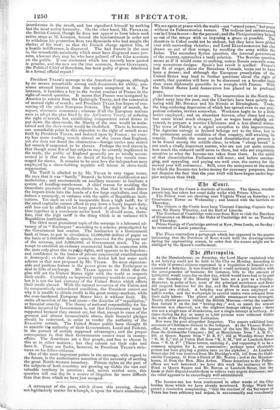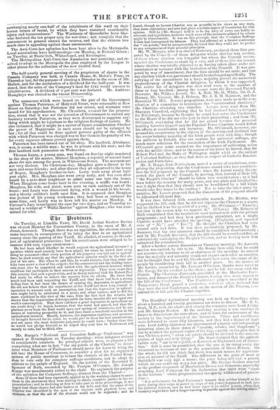int jfittropolto.
At the Mansionhouse, on Saturday, the Lord Mayor explained why a set holyday could not be held in the City on Monday, according to the wish of several citizens expressed in a requisition to himself to re- commend a holyday. It was found that it would seriously interfere with the arrangements of business : for instance, bills to the amount of 2,000,0001. would come due on that day, which would have had to be paid on the Saturday if the Monday had been set a part as a holyday. However, in point of fact, most of the principal merchants and firms did suspend business for the day, and the Stock Exchange closed at half-past two o'clock. A holyday was given to men employed on public works, and the workpeople in several trades were released from their daily labour. The places of public amusement were thronged. Nearly 30,000 persons visited the British Museum—twice the number that visited it on the last " boxing-day ;" and, as usual, the utmost decorum was observed, not the slightest damage taking place : there was not a single case of drunkeness, nor a single attempt at robbery. At times during the day as many as 1,500 persons were collected within the walls of the Polytechnic Institution. Nor were the poor altogether forgotten. The papers exhibited long accounts of Christmas-dinners to the indigent. At the Thames Police- office, 101. was received as the bequest of the late Mr. Davidge, 10/. from the Goldsmiths Company ; 201. at Marylebone from " A. B. C.,'' 201. at Queen Square from • D. E. F.", 201. at Worship Street from " G. H. I.," 20/. at Union Hall from "K. S. M.," 201. at Lambeth Street from " N. 0. P." [These letters, omitting J., and supposing S. to be a common misprint for L, are consecutive : perhaps some charitable person has been playing a golden tune on the alphabet.] At Lambeth Street also 101. was received from Mr. Davidge's will, 101. from the Gold- smiths Company, 5/. from a friend of Mr. Norton ; and at the Mansion- house, 5/. from the Hon. Miss Arden. These donations to the Police- offices are well bestowed : we have this week the testimony of Mr. Bond at Queen Square and Mr. Norton at Lambeth Street, that the fluids at their disposal enable them to relieve very urgent distresses ; and the relief appears to be exceedingly well administered.
The Income-tax has been condemned in other wards of the City besides those which we have already mentioned. Bridge Ward has passed a resolution complaining, "that the conduct of the Surveyor of Taxes has been arbitrary and unjust, in unnecessarily and vexatiously
surcharging nearly one-half of the inhabitants of this ward on their honest return of rental, by which they have sustained considerable injury and inconvenience." The Wardmote of Queenhithe have like- wise declared the tax proper only for war-time ; and complain that the assessments in general exceed the returns, and that the citizens lose mach time in appealing against those assessments.
The Anti-Corn-law agitation has been kept alive in the Metropolis. Local associations have held meetings—on Monday, at Bethnal Green ; on Tuesday, at Shorelitch, Whitechapel, and Kensington. The Metropolitan Anti-Corn-law Association met yesterday, and re- solved to adopt in the Metropolis the plan employed by the League in other places for the collection of the new 50,0001. fund.
The half-yearly general meeting of the proprietors of shares in the Canada Company was held, at Canada House, St. Helen's Place, on Thursday last, for the purpose of electing a Director in the room of Mr. Hallett, and for the declaration of a dividend for the half-year. It was stated, that the sales of the Company's land for 1842 would amount to 100,000 acres. A dividend of 6 per cent was declared. Mr. Ambrose Humphrys was elected to the vacant Directorship.
The summoses which were issued on the part of the Government against Thomas Patterson, of Holywell Street, were returnable at Bow Street on Saturday ; but Patterson did not attend, and warrants were issued for his apprehension. Mr. Chambers, counsel for the prosecu- tion, stated that it was not the intention of Government to extend any leniency towards Patterson, as they were determined to suppress any- thing which might be injurious to the religious feelings of society. He also intimated, that it might be a matter of future consideration whether the power of Magistrates in such cases should not be enlarged by law ; for all that could be done against persons guilty of the offences with which Patterson was charged was to fine them in the penalty of 40s. for every separate offence proved against them.
Patterson has been turned out of his shop. His landlord, Abrahams, was, it seems, a middle man ; he was in arrears with his rent ; and the first landlord took possession on Wednesday.
Thomas Leary, a youug man, was found on Sunday night murdered in the shop of his master, Michael Meaghan, a repairer of second-hand shoes for sale among the poor, in Whitecross Street. The accounts are not very distinct. On Christmas-day, Meaghan gave a dinner to his men and some friends; and after dinner they all adjourned to the house of Regan, Meaghan's brother-in-law. Leary went away about half- past eight. Mrs. Meaghan also went away early, and was soon after heard by a next-door neighbour to admit some one into the house. When Meaghan came home later in the evening, a scuffle was heard : Meaghan, his wife, and sister, were seen to rush suddenly out of the house: and Leary was discovered dying, with a wound in his breast, and a bloody cobbler's knife near him. It is supposed that Meaghan was jealous of his young workman ; they had been at variance for some time, and Leary was to have left his master on Monday. A Coroner's Jary investigated the case for two days, and on Thursday re- turned a verdict of " Wilful Murder" against Meaghan ; who was com- mitted for trial.























 Previous page
Previous page